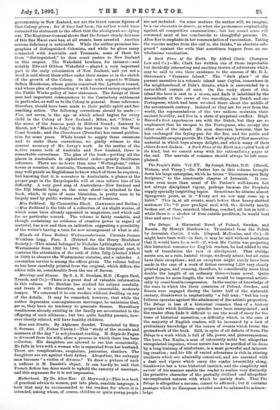A Dark Plate of the Earth. By Alfred Clark. (Sampson
Low and Co.)—Mr. Clark has written one of those improbable but decidedly interesting and exciting stories of adventure which may be said to owe their existence to the success of Mr. R. L. Stevenson's "Treasure Island." The "dark place" of the present narrative is a volcanic island near Ceylon, somewhere in the neighbourhood of Palk's Straits, which is surrounded by a never-lifted curtain of mist. On the rocky shore of this island the hero is cast in a storm, and finds it inhabited by the descendants of the crews of two war-ships, one Dutch and one Portuguese, which had been wrecked there about the middle of the seventeenth century. Isolated as they are for ever from the world, the representatives of the two nations maintain their ancient hostility, and live in a state of perpetual conflict. Hugh Harrod's first experiences are with the Dutch, but they are so unpleasant that he escapes to the Portuguese, who occupy the other en,' of the island. He soon discovers, however, that he has exchanged the frying-pan for the fire, and his perils and hairbreadth escapes provide Mr. Clark with plenty of that narrative- material in which boys always delight, and which many of their elders do not disdain. A Dark Place of the Earth is a c vital book of its kind, but we cannot away with the rationalising pages at the end. The marvels of romance should always be left unex- plained.










































 Previous page
Previous page